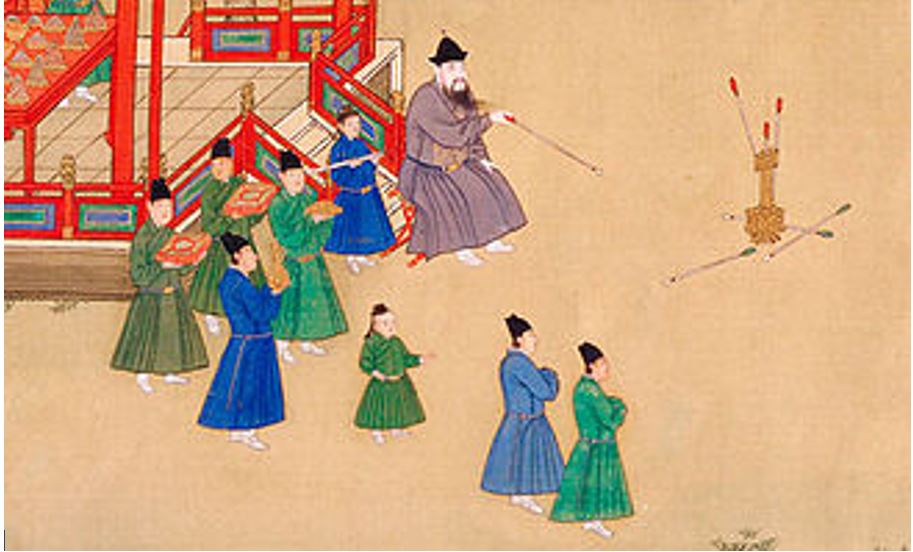Two weeks before the Moon Festival, Chen Hsi-wei was making his way east through Xuzhou. The itinerant sandal maker and peasant/poet had a whim to celebrate the holiday by the sea. The road to the east ran through the village of Wangtan. The region around was as flat as the moon cake Hsi-wei looked forward to enjoying when he arrived in Lang ye. Wangtan had no village gate; there was not much to see at all. There was a well and a wall but nothing that could be called a square, no shops or food stalls, not so much as an inn for weary travelers or thirsty farmers. If the village had a landlord, he must certainly live elsewhere. Gray, single-story cottages and tumbledown sheds made of loose planks were scattered irregularly among fields and trees. Hsi-wei was surprised to see nobody working in the fields, no children running about. The place seemed deserted.
Hsi-wei laid down his pack by the well and drew water in a leaky wooden bucket. The water was good, at least. As he drank, he heard a distant clamor. It appeared to come from what he took to be just a spit of the surrounding forest. Hefting his pack, he made for the trees. As he drew closer, what he saw wasn’t a chunk of the forest but a neatly laid-out, fair-sized apple orchard.
The whole of Wangtan must have been there. Two men were shouting arguments and threats. Children watched with big eyes as their parents either tried to pacify the men or joined into the dispute. Nobody paid attention to the dusty stranger with the pack on his back except for a kindly widow, Mrs. Chou. Smiling, she motioned him to come near. “Welcome,” she said. “As you see, things here are unsettled.” Without his needing to ask, she explained the row. “They’re arguing over who owns the orchard. It used to be Mr. Li’s but now nobody’s sure. It’s all down to that new law.”
It was only two years since Emperor Wen promulgated his great land reform, the Equal Field System, of which Hsi-wei approved. The Emperor was to be applauded for reducing the vast inequality in his newly unified Empire. Improving conditions for the peasants without dispossessing the gentry, the new law balanced progress with stability. Under the system, people could keep the land apportioned to them until retirement or death when it would revert to the government for reassignment. The law had specific rules about how much land the gentry could keep and the preservation of mulberry plantations, but it included no explicit mention of fruit orchards.
The garrulous Mrs. Chou continued to explain. “Old Mr. Li died in the spring, you see. The orchard had belonged to the Li family for three generations but his only son, poor Bolin, was taken by the army and never came back.”
“I think I understand,” said Hsi-wei. “And these two men own the land that borders the orchard.”
“That’s right. They both claim it.”
“But isn’t that up to the government?”
Mrs. Chou scoffed. “I suppose it should. The big man in the leather jerkin is Xu Jun-hie and the one with the red face in the wide trousers is Qian Dongye.” She pointed. “And that’s their cottages over there, beyond the paddy and that field.”
Hsi-wei pointed to a third nearby cottage. “And that one? It’s just as close, I think.”
“Oh, that’s the newcomer Zhi Hai-sui’s place. He married Li’s only daughter and took her away to live with his family in Zufan. Apparently, Li’s daughter didn’t get on with her mother-in-law and Zhi couldn’t bear his brother. A pair of bullies the daughter told me. So, when Mr. Li died in the summer, they moved into his place.”
“Are Mr. Zhi and Mrs. Zhi here?”
Mrs. Chou pointed to a thin man who looked diffident and submissive standing beside an obviously disgruntled woman. Her arms were crossed over her chest in a way that made her look both pugnacious and defensive.
“So,” said Mrs. Chou, “you asked about the government, right? Well, Xu and Qian both took themselves all the way to Pengchang to lay their claims before the magistrate but neither got an answer. They were told to wait but then the magistrate’s three-year term ran out and off he went so the matter wasn’t settled. If there’s a new magistrate, he hasn’t dealt with the orchard either. And now the apples are ripe.”
The villagers’ voices suddenly rose. “Diyu!” cried Mrs. Chou. “I think they’re about to fight it out.”
Xu grabbed a fallen branch. Quian reached into his trousers and pulled out a short knife. The two men faced off, threatening, circling, but not attacking. Their wives screamed. The crowd gasped. Half-a-dozen partisans shouted encouragement but everyone else pleaded with them to lay down their weapons.
Hsi-wei had an idea that rapidly swelled into a plan. Dropping his pack, he stepped boldly between the two incensed yet indecisive combatants.
The perplexed crowd murmured. The two angry men gawped at the stranger.
Hsi-wei gave his lowest bow. “My name is Chen Hsi-wei, a maker of straw sandals. I’m making my way east for the Moon Festival. When I arrived here, I thought the village was deserted. Then I heard all the commotion. Mrs. Chou here has very kindly explained the situation to me. With your permission, I would like to offer a humble suggestion.”
“Straw sandals,” sighed an old peasant, looking at the worn-out pair on his feet. Everyone else just stared at Hsi-wei. So did Xu and Qian, breathing hard, one still clutching his club, the other his knife.
Mrs. Chou spoke up. “Well, what is it, sandal-maker? Let’s hear that humble suggestion.”
Hsi-wei spoke slowly to give the two furious men time to calm down.
“I lived for a time in the capital, in Daxing. While I was there, a dispute arose between two high officials, both ministers. The imperial court took sides. The official story was that it was a quarrel over budgets, though the rumor was that it was really over a beautiful concubine from Yongzhou.”
Some of the men laughed.
“When the two ministers’ enmity threatened to have a violent outcome, the Emperor himself intervened. He ordered the ministers to resolve their difference peacefully, by playing the ancient game of Touhu. Touhu is said to date back even further than the Spring and Autumn period. It’s sometimes called Pitch-Pot. You may have heard of it or even played it.”
A few men said they had heard of pitch-pot.

“Then perhaps you’ll know it’s a simple game but a highly formal one. The contestants toss arrows into a jar. It’s said to have begun as a soldiers’ drinking game but, when it was taken up by scholars, it grew more formal. The rules of Touhu are recorded in the Lijing, The Book of Rites. For instance, the players have to be invited three times before they can proceed. The object is to throw arrows into a pot with a wide belly, a narrow neck, a wide lip. The contestants are to stand six paces from the pot. The score is kept by a master of ceremonies, someone neutral. There are four rounds. The first arrow is worth ten points; the second and third five each, and a success with the last throw is worth twenty points. Should a player miss his first toss but his next three go in the pot, he’s awarded one extra point. Leaners and arrows that go in with the point up don’t count. When the master-of-ceremonies declares a victor, the losers must kneel before him and accept a cup of wine. Then wine is poured out for the whole company, a survival of the game’s origin.”
“You’re long-winded for a cobbler,” one peasant joked. Hsi-wei was pleased by the general laughter this remark evoked.
“I suggest the dispute over this orchard be settled with a game of pitch-pot. As I’m a neutral outsider, I volunteer to keep the score. After that, I’ll be happy to take orders for new sandals.”
Neither Xu nor Qian responded; but the village’s mood had changed, and their neighbors urged them to accept Hsi-wei’s proposal.
“I still have my bow and a dozen arrows from the war,” a veteran volunteered. “And I’ve got a pot that would do,” another added. “It’s got a long neck too.”
“Play! Play!”
Looking disgusted, Xu let go of his branch. Qian, concealing his relief, put away his knife.
Hsi-wei had more to say. He went over to Zhi Xian-hue. “Mr. Zhi, I’m told that your property also borders this orchard. Is that so?”
Zhi looked around nervously at the neighbors who had not welcomed him. He gave a reluctant nod only when his wife elbowed him.
“Then there are three contestants,” Hsi-wei proclaimed, already assuming the authority of the master of ceremonies described in the Lijing.
Xu and Qian threw dark looks in Zhi’s direction.
“Well, I guess it’s only fair,” the indispensable Mrs. Chou chimed in.
And so, under Hsi-wei’s direction, the game proceeded. A table was set up, the long-necked, wide-mouthed jug set on it, the arrows fetched, and the distance paced off.
Hsi-wei asked if anybody had wine. The request was met with general approval, and several men ran to their homes and returned with big jars of homemade brew.
The three contestants lined up beside the arrows that had been spread out in a reed winnowing basket. People jostled for a good view. Excited children wormed their way to the front. After reminding them that they had to decline twice and accept the third time, Hsi-wei solemnly invited the men to play.
Xu was the first to try. The big man held the arrow carefully between his thumb and index finger, just as Hsi-wei did his brush. At six paces, the task looked not just difficult but, on a first attempt, impossible. And yet Xu managed it. His arrow flew up and fell as neatly into the jug as if the latter had been calling to it. A huge cheer went up and, when it calmed down, Hsi-wei announced “Twenty points for Mr. Xu!” This evoked more cheering. A big grin spread across Xu’s broad face.
Qian was next. He insisted Hsi-wei bring him the same arrow as Xu had. He too held it like a brush, paused, concentrated, and threw. His toss fell well short, missing not only the jug but the table. He cursed and his supporters groaned.
“The gods know, Qian!” bellowed the confident Mr. Xu.
Hsi-wei had to take the Zhi by the arm and almost drag him to the line. There was some sniggering from the crowd.
Zhi carelessly chose an arrow. Unlike the others, he tossed the shaft underhanded, scarcely bothering to aim. The arrow overflew the jug, nearly hitting a woman who was standing too close. She gave a little cry as she leapt back. Her husband scolded Zhi and shook his fist at him. Xu laughed triumphantly.
But Xu missed his second attempt, while Qian, to everyone’s surprise, succeeded.
“Five points to Mr. Qian!”
Zhi stuck by his unconventional method. His arrow again rose high then, to the astonishment and consternation of the crowd, plummeted into the jug. The point made a sharp sound.
Hsi-wei was pleased but gave no sign of it. “Five points for Mr. Zhi!”
Xu took his time before making his third toss. He aimed carefully, closing one eye like an archer. His arrow bounced off the side of the jug.
Qian’s next effort looked promising too, but it narrowly missed the jug and stuck in the table.
Zhi hardly paused before making his third toss, but it landed as neatly in its target as his second.
“That’s five points for Mr. Zhi. One more round, unless there’s a tie,” declared Hsi-wei. “The score now stands at ten points for Mr. Xu, five for Mr. Qian, and ten for Mr. Zhi. Remember, the final toss is worth twenty points.”
Xu picked up and put down three arrows before choosing the fourth. He stepped to the line, licked his finger, tested the wind, and threw. The arrow struck the lip of the jug and rattled in.
Applause broke out and Xu received congratulations on all sides, even from Qian’s partisans.
“Mr. Zhi?” said Hsi-wei.
Zhi stepped to the line, looking defeated already, grabbed an arrow at random and, without ado, lofted it straight into the jug.
People fell silent, shocked. “He hardly aimed,” one man groaned. “Dumb luck,” muttered another. “A tie!” declared a third, looking to Hsi-wei. “Thirty points for Xu and thirty for Zhi, right?”
“Not so,” said Hsi-wei. “Mr. Xu made his first and last attempt for thirty points, but Mr. Zhi made all three of his last attempts and so, by the rules of Touhu, he has earned one extra point. Mr. Zhi is the victor by that one point.”
Except for Mrs. Zhi, nobody was pleased. There were protests and some complaints, but Hsi-wei reminded everyone of the rules he had laid out in advance, rules, he reminded them, that went back centuries and were strictly adhered to in Daxing. “Unless and until the government says different, this orchard belongs to Mr. Zhi.”
Hsi-wei saw to it that the rules were followed after the game as well. He had Zhi’s wife bring her husband two cups and a jug of millet wine. Xu grumbled and Qian glared but both knelt before an apologetic Zhi as his wife filled the cups and proudly handed them to her husband. Before serving them to his competitors, Zhi looked to Hsi-wei who smiled and nodded.
A half-hearted cheer went up, and men dashed off then returned with more jugs of wine. Though everyone had not remembered about the extra point, everybody recalled that the grandees in Daxing all got drunk after a game of Touhu. Could the citizens of Wangtan do less?
An old man produced a battered erhu and a young woman a bamboo pipa. The adults sang and danced. The children skipped about, delighted with the day’s unexpected entertainment.
Hsi-wei consented to only one cup of the rough homebrew, so different from the smooth yellow wine of Daxing. When the celebration was at its height, he drew Zhi aside, leaned close, and whispered in his ear. Zhi lit up and nodded eagerly.
“Go ahead,” Hsi-wei encouraged him. “Say it to all of Wangtan.”
Zhi stood by the table, struck the jug twice with his cup, and asked for quiet.
“Mr. Xu and Mr. Qian, my neighbors, this orchard may now be mine by virtue of good luck. But the apples should belong to us all together. With your approval, the crop will be divided equally among us, split three ways.”
Qu, who was on his fourth cup of wine, slapped Zhi on the back and Qian took his hand, even offering a little bow. Mrs. Zhi was encircled by the women of Wangtan, and Hsi-wei took orders for twelve pairs of straw sandals.
A week later, Hsi-wei stopped at an inn on his way to the sea. In the small room he had enough money to pay for, he wrote the following verses. As was his custom, he did not give his poem a title, but, when it began to circulate, people gave it two. Some call it “Three Can Share,” others know it as “Three Merchants from Yanchan.”
Jia’s mother set three fa gao on the plate,
one for Jia, one for Mei, one for them to share.
Jia’s sister Mei snatched the third treat while
he obeyed his mother and took just one.
Glaring at his big sister, Jia expressed a child’s
first morality, loudly protesting “It’s not fair.”
The Eastern Turks coveted more pastureland.
The Emperor vowed not to yield a single mu.
Twenty years of war left thousands of men
rotting on the frontier, transfixed by spears,
hacked by axes, stabbed by swords, and the
grassland was as useless for grazing as for farming.
The chronicles record how, on the death of
the Duke of Shun, Lord Liu and Count Meng
elbowed aside the youthful heir and laid claim
to the title, land, and the famed concubine Luzhu.
Their vassals fought it out. As for Luzhu, she cared
as little as the gardens of Shun about who would win.
Having heard of rich jade deposits by the Hotan River,
three merchants traveled together from Yanchan to Heitan.
The peasants offered them a bargain of fine green jade,
asking far less than its value. Though each Yanchan
merchant was keen to buy it all for himself,
they agreed that each would take an equal measure.
Have you noticed that three
can share what two cannot?
How often people mistake
self-regard for justice?
Avarice is one aspect of vanity
and conceit one face of greed.
To read more Hsi-wei tales, click here
About the Author

Robert Wexelblatt is a professor of humanities at Boston University’s College of General Studies. He has published seventeen collections of short stories; two books of essays; two short novels; three books of poems; stories, essays, and poems in a variety of journals, and a novel awarded the Indie Book Awards first prize for fiction.












